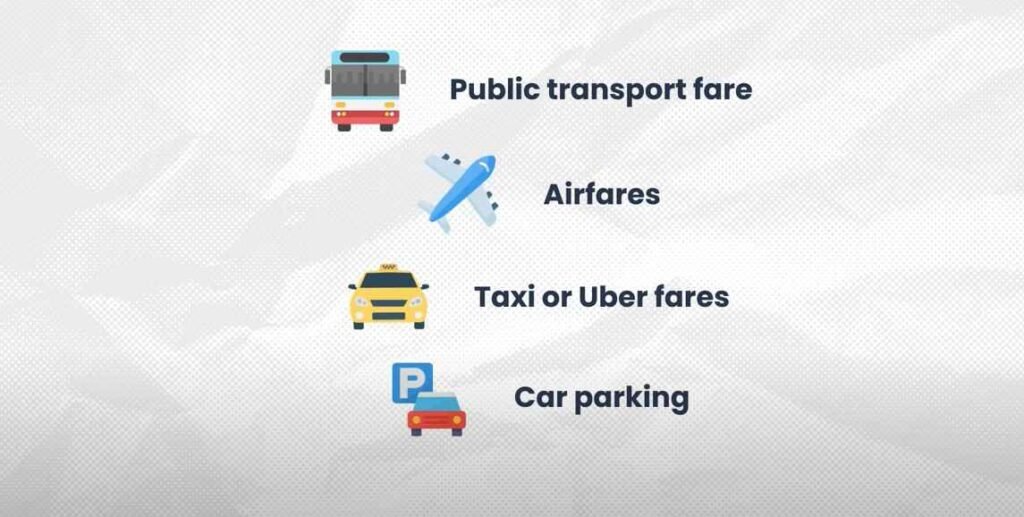How Much Travel Expenses Can I Claim Without Receipts? In the UK, you can claim up to £8 per night for travel expenses without receipts. For travel overseas, the non-receipt limit is £10 per night.
Managing travel expenses can be a challenge, especially when you’re on the move and receipts are easily misplaced. Whether you’re self-employed or running a business, it’s essential to keep track of your spending for tax purposes.
The HM Revenue & Customs (HMRC) in the United Kingdom offers a small concession for those incidental overnight costs incurred while on business travel.
This allowance provides a buffer for taxpayers to claim a modest amount without the need to present physical evidence for every penny spent. It’s designed to cover minor expenses like drinks and snacks that may not always come with a receipt.
Remember, this relief is meant to simplify record-keeping, not to replace the necessity for thorough documentation for larger expenses. Keeping proof of purchase is generally the best practice for any expense claim.
Table of Contents
Toggle- Non-receipted Travel Expense Claims
- Scope Of Expense Claims Without Receipts
- Navigating Irs Per Diem Rules
- The Accountable Plan Essentials
- Limits And Thresholds For Receiptless Claims
- Recordkeeping For Receiptless Travel
- Employee Reimbursements Strategies
- Travel Expense Reporting Best Practices
- The Role Of Receipts In Proof Of Expense
- Tips For Maximizing Travel Expense Deductions
- Frequently Asked Questions For How Much Travel Expenses Can I Claim Without Receipts
- Conclusion
Non-receipted Travel Expense Claims
Traveling for business brings up the question of expense claims. What happens when you don’t have receipts? Non-receipted travel expense claims is essential. Claiming travel expenses without receipts has limitations and guidelines. The IRS sets rules on what is allowable; the per diem rates come into play here.
Irs Guidelines
The Internal Revenue Service (IRS) allows certain travel expenses to be claimed without receipts. For businesses using the IRS guidelines, the key is to maintain a log of the expenses.
- Travel mileage: Track your miles if you use your car for business trips.
- Meals and Lodging: You can use a per diem rate instead of actual costs.
Strict rules apply. Claims must be reasonable. Employees must provide a business reason for the expense.
Per Diem Rates
The per diem rate is a daily allowance. It covers lodging, meals, and incidental expenses. The General Services Administration (GSA) sets these rates.
| Expense Type | Per Diem Allowance |
|---|---|
| Lodging | Varies by location |
| Meals & Incidentals | Standard rate or specific city rate |
Business travelers can claim per diem rates. Keep your travel dates and locations documented. The IRS and employers still may require this.
Scope Of Expense Claims Without Receipts
The ability to claim travel expenses without receipts piques the interest of many business travelers. Provisions can lead to significant tax savings and adequate compliance with the IRS guidelines. Let’s explore what types of expenses fall under this category and what the IRS allows travelers to claim without physical receipts.
Meal And Incidentals
For those on the go, claiming meals and incidental expenses without receipts often falls under the per diem rates established by the IRS. These rates vary by travel location and are updated annually.
- Daily allowances cover meals and incidental purchases.
- Incidentals include tips and fees for services, such as porters.
It’s essential to adhere to the per diem guidelines to ensure your expenses are recognized.
Mileage Reimbursements
Mileage reimbursements ease the burden of business-related vehicle use. The IRS sets a standard mileage rate, which eliminates the need for detailed gas receipts.
| Year | Standard Mileage Rate |
|---|---|
| 2023 | xx cents/mile |
Keep a log of travel with dates, distances, and purposes to substantiate claims.
Navigating Irs Per Diem Rules
Traveling for work brings about the puzzle of tracking expenses. The IRS allows for simplified reporting through per diem rates. these rules is vital for claiming travel expenses without receipts.
Determining Eligible Days
Eligible days for per diem must fall under work travel. Know these essential points:
- Work travel is when you’re away from your tax home.
- The IRS requires that it must be longer than an ordinary workday.
- You need to get rest or sleep to meet the demands of your work while away.
Per Diem Vs. Actual Expenses
Choose between per diem rates or actual expenses. Consider these:
| Per Diem | Actual Expenses |
|---|---|
| – Set amount per day | – Based on real costs |
| – No receipts needed | – Keep all receipts |
| – Simplifies reporting | – More accurate |
Select per diem for convenience or actual expenses for precise claims.
The Accountable Plan Essentials
A business journey brings financial intricacies. Among these are travel expenses. Understanding the Accountable Plan essentials is key. This plan is a method the IRS endorses. It helps employees and employers report or reimburse business expenses properly. Let’s unwrap the conditions and impacts of an Accountable Plan on deductions.
Conditions For An Accountable Plan
An Accountable Plan must align with IRS regulations. First, expenses must have a business connection. They should be essential for your job. Second, you must adequately account for these expenses within a reasonable time. Lastly, you should return any excess reimbursement. This should happen within a set time-frame. Here’s a breakdown:
- Business Connection – Expenses occur while performing services as an employee.
- Adequate Accounting – Provide your employer with detailed information of the expenses, such as amount, time, place, and business purpose.
- Excess Return – Return any amount not used for business-related expenses within a reasonable period.
Impact On Deductions
Under the right plan, employees do not report reimbursements as income. These amounts are not subject to tax withholding or W-2 reporting. This is true when they substantiate the expenses. Proper substantiation means providing a log, diary, receipt, or other credible record. Without receipts, the IRS sets per diem rates. These are daily allowances for lodging, meals, and incidental expenses.
Employers deduct the reimbursed expenses on their tax returns. But, without an Accountable Plan, reimbursements might count as income to employees. This means higher taxes for both parties. Per diem allowances also have their limits without receipts. So, adhere to the Accountable Plan to maximize deductions for both employees and employers.
Limits And Thresholds For Receiptless Claims
Claiming travel expenses without a receipt can often be a confusing task. There are specific limits and thresholds to consider. It is essential to understand the rules to maximize claims and stay compliant with tax regulations.
Maximum Non-receipt Claim Amounts
Travelers can claim certain expenses without receipts, up to set amounts. These limits are in place to simplify record-keeping for smaller expenses. Let’s explore the maximum amounts that can be claimed without the need for receipts:
- Meals and Incidentals: Up to a specific daily rate depending on the travel destination.
- Mileage: Rates per mile for a set number of miles traveled using personal vehicles.
- Tolls and Parking Fees: Small tolls and parking fees under a specific value.
Special Circumstance Allowances
In special circumstances, higher claim amounts without receipts may apply. These are exceptions to the standard limits:
| Special Circumstance | Allowable Expenses |
|---|---|
| Lost or Stolen Receipts: | Affidavit or declaration may permit higher claims. |
| Natural Disasters: | Additional accommodation and meal costs. |
| Remote Locations: | Increased per diem rates due to limited accessibility. |
These limits and special allowances ensure proper compliance and maximize reimbursements when receipts are not available. Always check with tax professionals or refer to the latest tax guidelines, as these amounts can change annually.
Recordkeeping For Receiptless Travel
Recordkeeping for Receiptless Travel plays a vital role in managing finances. Sometimes, you might not have a receipt for every travel expense. The IRS allows for certain claims without receipts, but this requires diligent recordkeeping. Knowing which documents can serve as proof of your expenses is critical to ensure compliance and to protect yourself during an IRS audit.
Alternative Documentation
When receipts are missing, other forms of documentation can support your claims:
- Bank statements: Show charges related to travel.
- Credit card statements: Highlight specific travel costs.
- E-tickets and boarding passes: Confirm dates and destinations.
- Rental agreements: Provide details of transport use.
- Hotel invoices: Sometimes digital copies are valid.
Keep these records organized in case the IRS questions your claims.
Irs Audits And Your Records
In an audit, the IRS may review your travel expenses. Without receipts, organized alternative records become important:
| Type of Expense | Document Suggested |
|---|---|
| Lodging | Hotel Invoice or Bank Statement |
| Transportation | Rental Agreement or E-ticket |
| Meals | Credit Card Statement or Bank Statement |
Create a digital folder for each trip. Label files clearly. It simplifies your audit defense.
Employee Reimbursements Strategies
Employee Reimbursement Strategies are essential for both employers and staff. They help manage travel expenses smoothly. Firms can set limits for claims without receipts. Understanding strategies for employee reimbursements is the first step in optimizing this process.
Setting Up A Reimbursement Policy
A clear reimbursement policy guides employees on expenses. It defines limits and processes. Businesses can decide how much to reimburse without receipts.
- Fixed Per Diems: Offer daily allowances for meals, lodging, and incidentals.
- Mileage Rates: Compensate for business travel using personal vehicles, based on standard mileage rates.
- Spending Caps: Set maximum limits for various spending categories.
With a policy, firms prevent confusion. They ensure fairness in employee claims.
Educating Employees On Non-receipted Claims
Proper education ensures compliance and simplifies the reimbursement process. Businesses should train employees on allowable expenses and limits.
- Conduct training sessions on the reimbursement policy.
- Use simple examples and scenarios to clarify rules.
- Distribute user-friendly manuals or guidelines.
This training reduces errors. It also strengthens trust between employees and management.
Travel Expense Reporting Best Practices
Managing travel expenses efficiently is crucial for both individuals and companies. Staying on top of your travel expenses ensures financial accuracy and avoids any potential issues with tax claims, especially when receipts are not available. Here are some best practices to optimize your travel expense reporting process and ensure that you claim the correct amounts with minimal hassle.
Using Expense Management Software
The right software streamlines expense tracking, allowing you to capture expenditures as they happen. Modern applications offer features like receipt scanning or automatic import from credit cards, eliminating the need for physical receipts. Here’s how to maximize its benefits:
- Select software with mobile access for on-the-go reporting.
- Use real-time data syncing to avoid data loss or discrepancies.
- Integrate the software with your accounting system for seamless operations.
- Train team members on its features for full compliance and usage.
Regular Expense Policy Reviews
Regularly update your expense policy to stay current with tax laws and company growth. Ensure everyone understands which expenses are reimbursable. Periodic reviews help in:
- Adjusting per diem rates and spending thresholds.
- Adding new categories for emerging expense types.
- Clarifying documentation requirements for better compliance.
- Communicating changes to all stakeholders effectively.
Adoption of these practices will help in maintaining a robust expense reporting system. It will lead to faster reimbursements and accurate tax filing, even without all the receipts.
The Role Of Receipts In Proof Of Expense
The importance of receipts is critical for anyone claiming travel expenses. Receipts act as the primary proof of expenditure, vital for successful claims. These slips of paper validate that a purchase occurred, the amount spent and the date. Essential during audits, receipts shield individuals from taxation issues.
Mitigating The Need For Receipts
Occasionally, receipts get lost or are impractical to obtain. Fortunately, alternative methods exist to verify expenses:
- Account statements: Credit card or bank statements can serve as substitutes.
- Electronic records: E-receipts or online booking confirmations are valid proofs.
- Expense journals: Meticulous recording of expenses in a diary helps when receipts are missing.
Knowing the allowed non-receipt-based claims is key.
Benefits Of Maintaining Receipts
Keeping receipts ensures smooth financial operations:
- It simplifies tax preparation, keeping stress at bay.
- Receipts provide a clear financial history, keeping track of expenditures.
- Disputes get resolved quickly with clear receipt evidence.
Adopting digital tools for receipt management can be a smart move.
Tips For Maximizing Travel Expense Deductions
Traveling for work often includes various expenses. It’s essential to know how much you can claim without receipts. Below are vital tips to maximize travel expense deductions smartly and legitimately.
Strategic Planning Of Travel
Plan your business trips with deduction rules in mind to claim the maximum amount. Three key elements to incorporate:
- Scheduling: Group meetings in a single trip to reduce costs.
- Documentation: Keep a detailed log of your travel dates and purposes.
- Policy Awareness: Understand IRS guidelines for deductible travel expenses.
Leveraging Credit Card Statements
Credit card statements can act as alternative proof for expenses. Steps to make the best use include:
- Match statements with your travel itinerary.
- Highlight the expenses related to business trips.
- Summarize expenses per trip in a simple table.
Date Description Amount 01/02/2023 Hotel Stay $200 02/02/2023 Client Dinner $50 - Retain statements for your records.
Remember to pair credit card statements with your travel log. This adds credibility to your claims.
Frequently Asked Questions For How Much Travel Expenses Can I Claim Without Receipts
Can I Claim Travel Expenses Without Receipts?
Yes, you can claim travel expenses without receipts if you qualify for the IRS per diem rates. These rates cover lodging, meals, and incidental expenses. The specific amount you can claim depends on your travel location and must be a reasonable estimate.
What Is The Irs Per Diem Rate?
The IRS per diem rate is the daily allowance provided for travel expenses. It varies based on the travel destination and time of year. Consult the IRS website for the current rates. They’re intended to simplify record-keeping for business travel expenses.
How To Track Travel Expenses Without Receipts?
For travel expenses without receipts, use a logbook or expense tracking app. Record the date, purpose, and amount of each expense. Ensure the amounts are reasonable estimates. This log can act as supporting documentation for your claimed expenses.
What Limits Exist For Claiming Travel Costs Without Receipts?
The IRS sets limits on the per diem rates claimable for travel expenses without receipts. It’s important not to exceed these limits, as claiming higher amounts may require detailed proof. Always adhere to the latest IRS guidelines.
Conclusion
Navigating travel expenses without receipts is tricky, but not impossible. Stick to the IRS per diem rates and keep a meticulous log. Always consult with a tax professional to ensure proper documentation and claims. Stay organized and informed to maximize your deductions safely.
Remember, careful planning leads to solid expense tracking and smoother tax filing.







